Zafar Bhatti, UK
Muting the Khalifa’s voice
The logical conclusion of Evans’ objections to the Khalifa speaking on issues of global peace, systems to relieve poverty, talking to politicians, or even sharing his views on homeopathic medicine (Far From the Caliph’s Gaze, p.92) is that the Khalifa should not shed light on any of these matters.
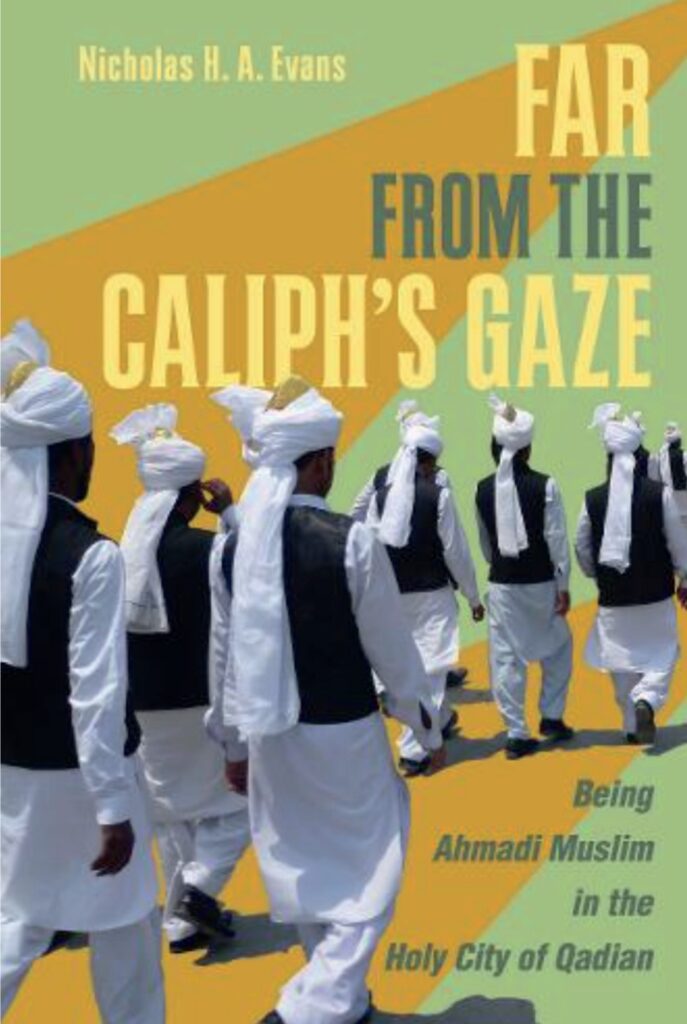
It is to redefine the role of the Khalifa and what he can and cannot do or say, and if we follow this through to its logical conclusion, it results in a Khilafat that has no role in society; he would just be a ceremonial head.
In this sense, the objection is nothing new and mirrors the early objections of the dissenting group within the Ahmadiyya Muslim Community, known as the “Lahori” group or Paighami group; a group who, in an attempt to wrestle authority away from the Khalifa and place it within their own self-renewing executive committee, also sought a similar aim; wanting a puppet khalifa, “who should take the pledge of allegiance from new members, should lead prayer services, should perform marriages and lead funeral prayers and no more” (Hadrat Maulawi Nur-ud-Dinra, Khalifatul Masih I by Muhammad Zafrullah Khanra, p. 159).
The first Khalifa of the Ahmadiyya Muslim Community, recognising this threat, responded that such a view was “guilty of contempt of the office of Khalifa.” (Ibid, p. 174)
The first Khalifa established and engrained the authority and importance of Khilafat throughout his life as the Khalifa. Thus, it was the first Khalifa of the Ahmadiyya Muslim Community who clarified the status and nature of the Khalifa, and not, as Evans incorrectly contends, a ploy by the Second Khalifa, to redefine the Khalifa’s status. (Far From the Caliph’s Gaze, p. 197)
Religion sheds light on all aspects of human affairs – it’s the nature and purpose of religion, as such a religious leader who is muted from speaking on affairs that affect us, is, in effect, a puppet religious leader; someone who cannot meaningfully provide any guidance to humanity, as he is beholden to restrict his words due to the controlling powerful elite.

The muting of institutions is a common form of censorship practiced throughout history by both democratic and autocratic regimes. Autocratic systems of government target by force all institutions that may have the potential to speak against them; whether religious, academic or the media.
In democratic systems, in a similar manner, but without the use of force, the religious authority is muted. Religious institutions cannot even comment on politics and mass media is controlled. The means used are different, but the end result is the same.
As such, in the Western world, we seldom see any religious leader speaking out on global inequality, unjust wars and oppression.
In Islamic history, there is a similar trajectory where the “Khalifa” became a symbolic title with nothing more to do but the bidding of the political ruling elite. Would such a Khalifa be even worthy of the name? Would such a Khilafat serve any purpose? Of course not.
But then, at the same time, if we accept that the Khalifa can provide guidance on any matter affecting human affairs, including political matters, does that then mean, as Evans argues, that the Khalifa has “political aspirations”?
One can easily understand the answer to this question by considering the following simple example:
Recently, in the UK, a Manchester United footballer, Marcus Rashford, spoke out about providing meals to school children during the summer holidays. So successful was this campaign that the government performed a complete U-turn and issued £15 weekly food vouchers to the affected families. When Marcus Rashford spoke out, would anyone say he had political aspirations? Of course not.
In fact, nowadays it is becoming common to snub those who have a voice and do not use it to speak out against social injustice. However there is a difference between this and when a notable person, an influencer, speaks out, who does have political aspirations – someone like the actor, George Clooney or performer, Kanye West, both of whom are known to have thought about throwing their hat in the political arena as potential future presidents of the United States.
There is a dividing line between those who seek political rule and those who solely comment on political affairs. Every man or woman is free to comment in a democracy, but those who seek to rule either democratically or otherwise, seek to impose their opinion on others, whereas those who seek only to comment, do not seek to impose their opinion by any force. As such an influencer’s opinion is consensual.
Similarly, a Khalifa’s influence and authority is precisely this; it is by definition consensual, otherwise it does not exist; there is no question of imposition as it is up to people to freely accept or reject the advice. This relationship between the Khalifa and followers is something I will return to later in the article.
Ahmadiyya Khilafat practices what it preaches
I would like to illustrate a real-life example of a nation in which the political system has directly clashed with the Ahmadiyya Muslim Khilafat and, in turn, how Khilafat reacted. I am of course talking of Pakistan.
I have already mentioned the extreme measures which the dictator Zia took in an attempt to annihilate Islam Ahmadiyyat, promising to “ensure that the cancer of Qadianism [a derogatory term for the Ahmadiyya Community] is exterminated”. (Suffocation of the Faithful, report of the APPG Inquiry into the persecution of Ahmadi Muslims and other religious communities in Pakistan, p. 5)
This was a culmination of state-led persecution of the Ahmadiyya Muslim Community in Pakistan, which had increased in its extremity since 1974. Unjust laws have been passed, hundreds of Ahmadi lives martyred, shops burned, students ostracised, denied the right to vote, denied the right to practice the Islamic faith and hated by society.
Yet despite such vehement state-backed persecution, the Ahmadiyya Community continues to abide by the commandment of the Holy Prophet, peace and blessings of Allah be upon him, that “Loyalty to one’s nation is a part of faith.” (Safinat al-Bihar, Vol. 8, p. 525, Mizan al-Hikmah)
It is in this that the power of Khilafat lies. There is a world of difference between saying the right thing and doing the right thing. Every Muslim is aware of the commandments of the Holy Prophetsa, yet in the world today, we see Muslims in many countries rising up and causing civil unrest and rebellion within their countries due to perceived injustices, even though the Holy Prophetsa has clearly forbidden Muslims to rebel against the state.
Yet in contrast, despite over 70 years of state-backed political persecution of the Ahmadiyya Muslim Community in Pakistan, there is not a single example of Ahmadiyya terrorism, even when the heart of the community, Khilafat, was targeted.
The only thing that adheres the hearts of people to the right course of action is the Khalifa and his unwavering commitment to the commandments of the Quran and Holy Prophetsa. Otherwise, there is little doubt that the Ahmadis would have gone the same way as other Muslim groups and rebelled against the state and caused unrest.
Khilafat has guided Ahmadi Muslims to be patient and endure with prayers. Hopefully this will illustrate that the Ahmadiyya Khilafat practices what it preaches and is not a political office, but rather a spiritual office, whose purpose is to guide people along the path of righteousness and peace. As it is stated in the Holy Quran:
“Allah has promised to those among you who believe and do good works that He will surely make them Successors in the earth, as He made Successors [from among] those who were before them; and that He will surely establish for them their religion which He has chosen for them; and that He will surely give them in exchange security [and peace] after their fear: They will worship Me, [and] they will not associate anything with Me. Then whoso is ungrateful after that, they will be the rebellious.” (Surah al-Nur, Ch.24: V.56)
It will also illustrate why Ahmadis feel that the message of Ahmadiyyat, under the leadership of Khilafat, is the message that can bring global peace; it enables humanity to rise above base human emotions, and instead of seeking revenge and retribution, enables us to seek peace and reconciliation.
Inherited distrust of Khilafat
I was born and raised in the UK, and for most of my life, I have had the good fortune of personally observing the Khalifa living in the UK. It has been over 35 years since the fourth Khalifa was forced to migrate to the UK from Pakistan. Since then, two Khulafa have resided in the UK, with the current Khalifa residing in Tilford, Surrey.
During this time, both have been universally recognised as men of peace, love and compassion – world leaders, the public, institutions and even governments have expressed how they have learnt true Islamic teachings from the Ahmadiyya Khilafat. The following are a few select quotations from notable world leaders about the Khalifa:
“You have been persecuted for your beliefs, jailed for your faith and exiled from your homeland, but you refuse to turn to bitterness or vengeance” (Speaker of the United States House of Representatives)
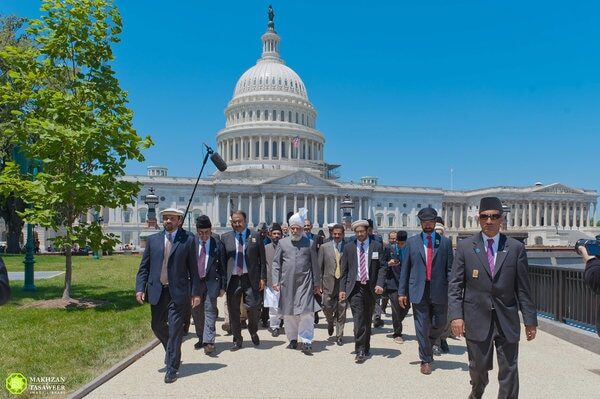
“I have met His Holiness myself, and I respect his strong commitment to promoting peace and understanding. At a time when extremists are seeking to divide us, His Holiness has delivered an inspiring and peaceful message of love overcoming hatred.” (Theresa May, Former Prime Minister of the United Kingdom)
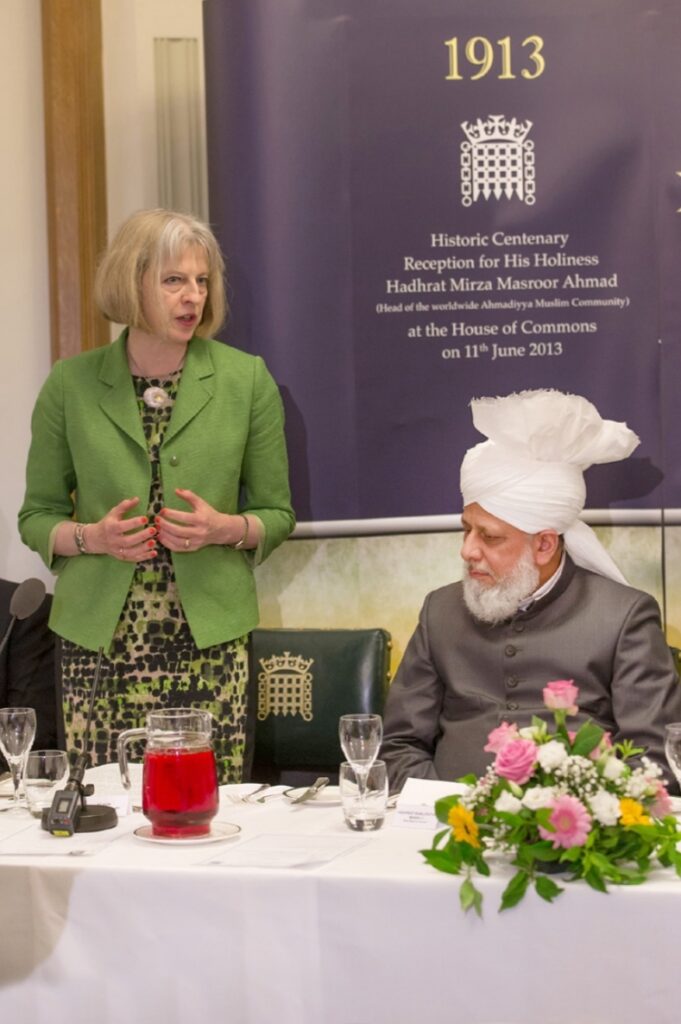
“Having had the opportunity to sit down a few times with His Holiness, and to hear his deep commitment to the world, not just to the Ahmadiyya Community, but to seeing more peace, more openness, and more love throughout the world is truly astonishing and encouraging, this Ahmadiyya Message of ‘Love for all and hatred for none’ is one of those things we need a lot more of in the world …” (Justin Trudeau, Prime Minister of Canada)
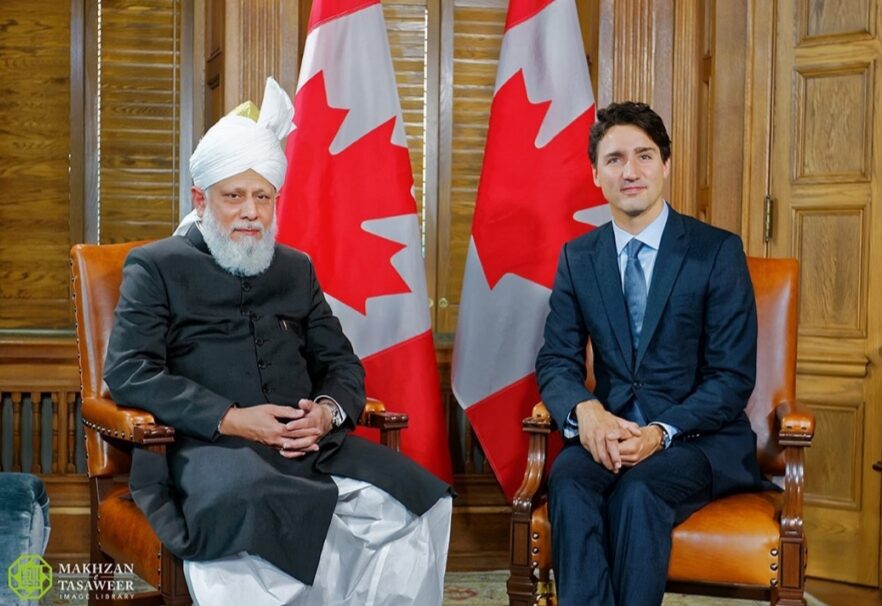
Despite this acknowledgement of the Khalifa as a “man of peace” by people living in the West, having been raised in the West, I had always been expecting a critique against the system of the Ahmadiyya Khilafat as an institution.
Although in Muslim countries, a critique of this institution is easier to understand due to the clear ideological differences, in the West, the ideological differences may at first glance seem obscure.
There is something about Khilafat that goes against the grain of “Western society” and how we are brought up here. We are raised to doubt authority and in particular to reject any authority that lies in a single individual, whether religious or political. We have doubts and distrust in any strong form of leadership – something alluded to in Evans’ book where he constantly talks about the relationship of “doubt” with the Ahmadis, summarising the “popular criticism about the intellectual practices of South Asian Muslims … that they do not appear to know how to doubt ‘properly’.” (Far From the Caliph’s Gaze, p. 42)
There is something ingrained in those living in the West to reject “definite” authority – whether religious or political – and we are taught that with freedom of thought comes the rejection of definite authority.
For instance, our religious system in the UK is based on the rejection of the Pope as the religious authority and although protestants have a head of church, yet their leadership does not have the same “definite” authority as the Pope. What is or is not Christian is by and large left up to an individual’s own interpretation, rather than reference to a figurehead or indeed reference to even the religious text.
In terms of the political situation, it is very much coloured against the backdrop of authoritarian fascist regimes of the second and post-second world war; the rise of Hitler, Mussolini, Stalin are all seen as the anti-thesis of our democratic system.
As such we are taught that democracy is the antithesis of authoritarianism, and that compared to the despotic dynasties of the past, we are living in a golden age. We are taught to doubt political authority and to challenge it; the primary cornerstone of society is the freedom of an individual. Yet the reality of the country in which we live is somewhat more convoluted.
From the earliest age, we are shown through government run institutions i.e. schools to not only think in a certain way but also to follow authority – any reaction against authority is met with severe sanction.
Our laws govern more parts of our lives than possibly any time in the history of human civilisation – we are held accountable for simply littering the street or walking the road in the wrong manner; God forbid if our child misses a day off school for an “unacceptable” reason!
Seemingly we have the freedom to elect our governing authority, yet in reality, after 18 years of graduating from a regimented curriculum designed by the state, our major source of information that directs our thought processes comes from the media, which is controlled by a few hands.
There are evident limits to the independence of our thought and the freedom of our actions. One consequence of our system is the illusion of freedom. And this illusion of freedom and control however “counterfeit” (a term Evans loves to use throughout his book) has resulted in something: we do not believe in certainties or definite values; we hold in suspicion an individual who claims that they follow a leader who can provide certainty. This to us is inherently suspicious, and as such, when we have strong leaders, an inherent distrust eventually takes over our sentiments.
As such, I understand Evans’ distrust of the system of Khilafat and how this suspicion colours everything he encounters in relation to the Khalifa – after all, living in such countries, we tend to have an inherent distrust and scepticism towards authority.
However, is this distrust justified? I would like to explore the system of Khilafat in Islam so as to remove this inherited distrust.
Spiritual, not political
The first thing to note is that the Ahmadiyya Khilafat is a spiritual system of leadership rather than a political one. This has already been made clear in part one of this series and is one of the distinguishing features of the Ahmadiyya Muslim Community as compared to mainstream Islamic groups. As such, I will not talk any further on this issue.
Authority based on freedom, not compulsion
The second aspect to note is that the authority of the Khalifa as the representative of the Prophet on earth is not based on any form of compulsion – religion or spirituality cannot be enforced, as the Holy Quran states “There is no compulsion in religion.” (Surah al-Baqarah, Ch.2: V.257)
The main thing that binds the relationship of the disciple and the Khalifa is the bond of love, and it is upon this love that the authority of the Khalifa rests.
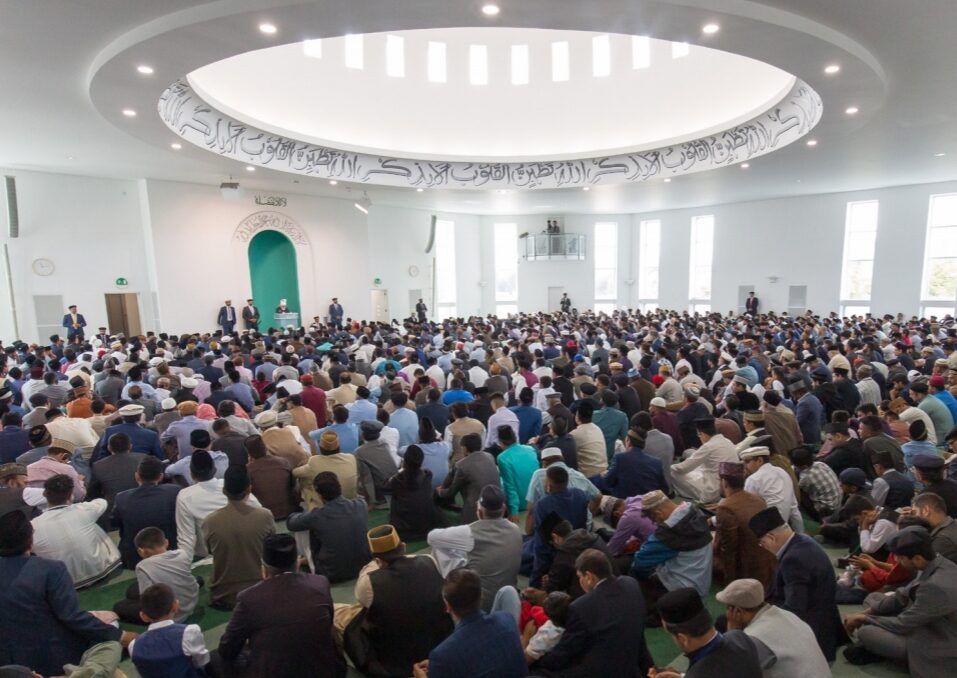
This is in stark contrast to an authoritarian regime whose authority rests purely on the basis of fear – with the citizen compelled to conform to the rules of the regime out of the fear of severe retribution.
In that sense even a democratic system is closer to an authoritarian system than it is to Khilafat, as in a democracy, rules are implemented based on the premise that those who break the rules will undergo some form of punishment.
Khilafat is the ultimate form of democracy – the authority the Khalifa yields is entirely consensual; by definition it is not and cannot be imposed. Furthermore each individual who chooses to submit to this authority, pledges in an individual capacity to submit to it; every time a new Khalifa is elected, each Ahmadi Muslim will renew their pledge confirming that they also agree to be bound under his allegiance. Similarly every year they will reconfirm this pledge. As such, in the system of Khilafat, there is no compulsion, no force.
Sometimes it is alleged that the Ahmadiyya Muslim Community can mete out punishments, but such sanctions have nothing to do with any kind of material loss to the individual and are only restricted to the relationship of the disciple with the Khalifa and in fact can result in an apparent material gain to the disciple. For example, one sanction maybe the refusal of the Khalifa to accept monetary donations to the community from a particular member. This is highlighted by Evans in his book on page 59: “It is the refusal of the Jama‘at to accept donations … that is said to be the most painful aspect of their punishment”.
This sanction, effectively, results in income loss to the Community and an income boost to the one the supposed sanction has been taken against! A similar analogy in a state would be that a person who has committed a crime, would be punished by being refunded his income tax! As such, one can only understand such sanctions in terms of love, where say a wife refuses the meal cooked by her husband in protest of some wrong done by the husband or indeed, vice versa.
This authority based on love rather than fear between Khalifa and disciple finds an interesting analogy in the life of the Holy Prophet Muhammadsa.
It is related that when Prophet Muhammadsa married his wife, Hazrat Khadijara, she offered Prophet Muhammadsa all her wealth and slaves. After re-confirming with Hazrat Khadijara, the Holy Prophetsa distributed all the wealth to the poor and freed all the slaves. However, one slave by the name of Zaidra preferred not to be freed, but rather to live with the Holy Prophetsa.
After some time, the family of Hazrat Zaidra tracked him down and approached the Prophetsa to ask for the freedom of Zaidra. The Holy Prophetsa replied that he had already been freed and the family was free to take him back. The family then approached Zaidra, who replied that although he loved his parents, he loved the Prophetsa even more and would rather spend the rest of his life with him rather than returning to his family. One could safely assume that he would rather be a slave of Muhammadsa than a free man.
In reciprocation, Muhammadsa declared Zaidsa as his son. This encapsulates the relationship of love and the authority which is born from that with the chosen one of God, and hence, it encapsulates the relationship between the Khalifa and his disciples – a relationship built on love rather than fear.
At this instancem I think it is fair to share some anecdotes that magnify this relationship – how the Khalifa is the first one we run to, to share our problems and our happiness with; elements of which even Evans condescendingly acknowledges.
1. I remember an incident which my late maternal grandmother related to me, who was born in Qadian in the 1920s. She used to tell me that when she was a little girl, her father passed away, and the only thought she had in her mind was to run to the Khalifa of that time, Hazrat Mirza Bashiruddin Mahmud Ahmadra. As such, she ran into his home and found him, upon which he embraced her and said, “Do not worry as I am now your father”. This provided comfort to my grandmother even seventy years on from the incident.
2. I am an eye witness to a very similar account that occurred around 60 years on from the above-mentioned incident in the 90s. I had volunteered myself to spend the summer holidays after my A-levels in the Khalifa’s office. On one particular occasion, I remember two middle-aged women coming into the office in the middle of a working day. One of the ladies was visibly distraught and the accompanying woman then proceeded to explain to the private secretary that her son or daughter had been admitted in an emergency to hospital in a serious condition or maybe had just passed away – I cannot remember which. As such, she just wanted to meet the Khalifa so that she could bare her pain and share the sorrow. The private secretary sent a message to the Khalifa and immediately, the two ladies were admitted into the office of the Khalifa. Although 60 years apart and a different man had assumed the office of Khilafat, the care and love for the community as a father was still the same. For the followers the man we turn to is a man of God. Indeed the quality of love for humanity that distinguishes every Khalifa is a reflection of the love that the Holy Prophet Muhammadsa had for humanity. The first Khalifa of the Ahmadiyya Muslim community alludes to this very fact saying, “Khilafat is a sort of vice-prophethood and both are gifts of God. I conceive, however, that this grace is attracted by the service of humanity and I have been inspired by this sentiment since my early youth. I have always been keen to serve everyone without distinction of caste, creed, country or nationality both intellectually and practically.” (Hadrat Maulawi Nur-ud-Dinra, Khalifatul Masih I by Muhammad Zafrullah Khanra)
3. Even 1,300 years earlier, amongst the first Khulafa of Islam, we find this same love and care for humanity. There is a particular incident about the second Khalifa of Islam, Hazrat Umarra, who at that time was not only the spiritual head of the Muslims, but also the ruler of large portions of the Eastern Roman and Persian empires that illustrates this point. It is related that Hazrat Umarra would disguise himself, so as to secretly assess the situation of the inhabitants of the city. On one occasion, he happened to encounter a house where a baby was crying and the mother was cooking only water on the stove with some stones inside. On his enquiry, the mother explained that she had no food to give to her children and was making them think she was cooking something and waited for them to go to sleep in the process. Upon this Hazrat Umarra rushed back to the treasury, picked up some bags of flour and other provisions and took them back to give to the lady. One of Umar’s servants requested the Khalifa to carry the flour, but Umarra replied, “Who would carry his burden on the Day of Judgement, and that it was his responsibility to look after the needs of the people.” Upon receiving the provisions of food, the woman exclaimed: “You should be the Khalifa as Umar does not even know the true state of his citizens.” Umar still in disguise replied maybe Umar is not so bad after all.
No Khilafat without consultation
Finally, the notion that the Khilafat is an autocrat who takes all decisions with complete disregard for the opinions of the community is completely false. According to a famous saying of Hazrat Umarra, “There is no Khilafat without consultation” (Izalat al-Khafa ‘an Khilafat al-Khulafa).
This makes it clear that the Khalifa consults and considers the opinions and input of the community. The Holy Prophet Muhammadsa was someone whose every word and action was based on the will of God, as the Holy Quran states, “He does not speak out of his own desire.” (Surah al-Najam, Ch.53: V.4-5)
Despite this being the case, he consulted his Companions so much that with regard to the Prophetsa, it was said, “I have never seen anyone who consults with his companions as much as the Holy Prophetsa.” (Al-Shafi‘i)
As such, this puts clear emphasis on a leadership that is in tune and in full consultation with the people. In the Ahmadiyya Muslim Community, this is given practical form in many ways:
1.There are formal institutions across many auxiliaries which regularly meet, discuss ideas and present them to the Khalifa. The foremost amongst these is known as the Majlis-e-Shura; a consultative body that is formed of elected officials at local levels who will meet once a year in each country to agree on financial budgets and key goals to achieve during the upcoming year. These deliberations will then be presented to the Khalifa for a final verdict.
2. The Khalifa directly meets in personal meetings (not official) around 70-100 members of the community each day in which members can talk to the Khalifa and present their opinion on any matter they may choose.
3. On a daily basis, the Khalifa receives thousands of individual non-official letters from members of the community. These range from all kinds of issues, including suggestions presented by members. There is no doubt that the ultimate decision rests with the Khalifa and he has the right to reject the majority opinion, as is stated in the Holy Quran, “… and consult them in matters [of administration]; but when you have made your decision, then put thy trust in Allah. Surely, Allah loves those who put their trust [in Him].” (Surah Al-e-Imran, Ch.3: V.160).
Personally, the only difference I see between this and how a CEO runs a company or any organisation is that a CEO is answerable to a board, whereas the Khalifa is answerable to God – I know which one I would rather be answerable to!

